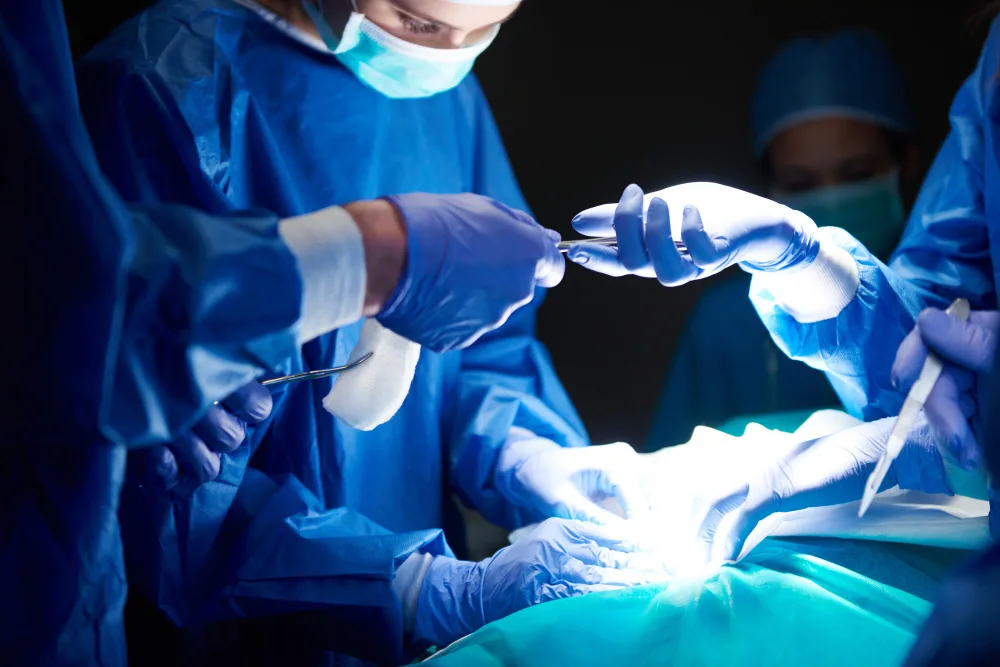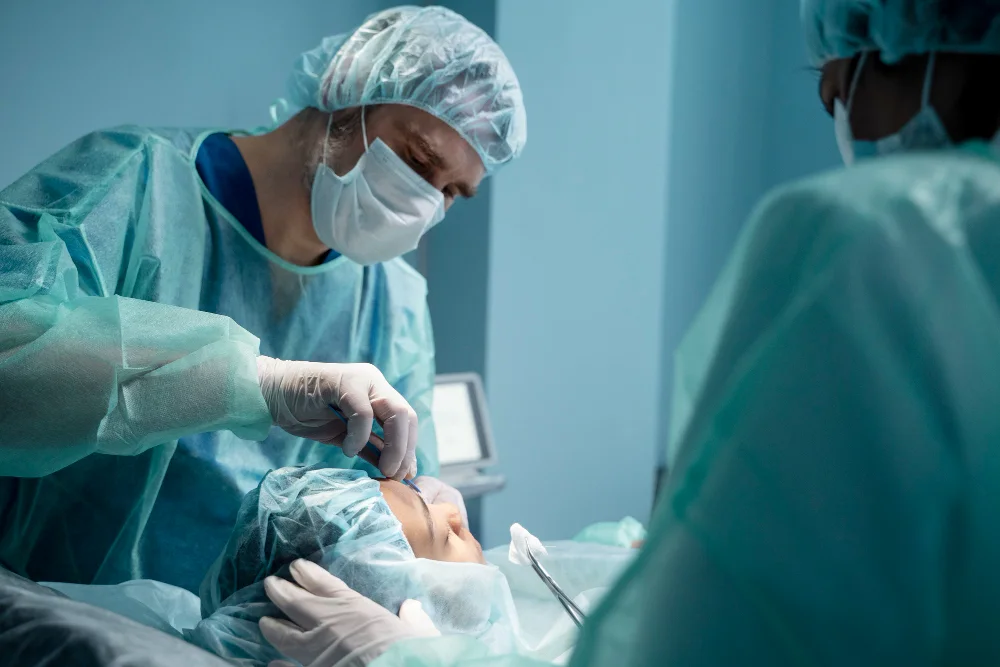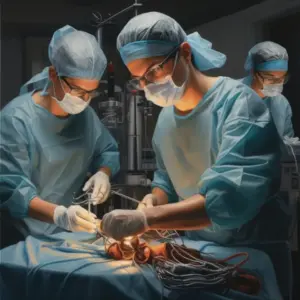Advanced General Surgery for Complete Care
Get advanced general surgery with experienced surgeons. Achieve effective treatment, faster recovery, and improved overall health.

General Surgery
General Surgery is one of the most vital branches of medicine that deals with the diagnosis, treatment, and surgical management of a wide range of diseases and conditions affecting various organs of the human body. This includes operations involving the digestive tract, abdomen, skin, soft tissues, endocrine glands, and more.
At VS Hospitals, Chennai, the Department of General Surgery is known for its excellence in performing both routine and complex surgical procedures. The hospital’s team of expert surgeons, anesthetists, and nurses work collaboratively to ensure precise, safe, and effective treatments for patients of all ages.
Combining advanced surgical techniques with compassionate care, VS Hospitals delivers world-class outcomes whether it’s a minor outpatient procedure or a major life-saving surgery.

Early Detection Saves Lives
Early detection and treatment are crucial for improving the chances of survival. If you notice any concerning symptoms, consult a healthcare provider immediately.
Signs and Symptoms
Persistent Abdominal Pain
May indicate appendicitis, gallstones, or hernia.
Swelling or Lump
Commonly seen in hernias, cysts, or soft tissue growths.
Vomiting or Nausea
Can occur due to intestinal obstruction or gallbladder disease.
Unexplained Weight Loss
A potential sign of digestive system disorders or malignancy.
Chronic Constipation or Diarrhea
May suggest bowel obstruction or colorectal disease.
Bleeding from Rectum or Stool Changes
Could indicate hemorrhoids, fissures, or colorectal issues.
Difficulty Swallowing or Indigestion
Often related to gastroesophageal reflux or hiatal hernia.
Delayed Wound Healing
Sign of infection, diabetes-related complications, or immune issues.
Painful Lump near Groin or Abdomen
May be a hernia that requires surgical correction.
Fever or Pus Formation
Indicates infection or abscess that may require drainage.
Blood in Urine
Hematuria - pink, red, or dark urine, the most common symptom
Frequent Urination
Feeling the need to urinate frequently, even when bladder is not full
Painful Urination
Experiencing pain or burning sensation while urinating
Back or Pelvic Pain
Pain that occurs as the cancer grows and spreads
Unexplained Weight Loss
Significant weight loss not related to diet or exercise
Fatigue
Feeling unusually tired or weak without a clear cause
Meet Our Expert General Surgery Specialists
Risk Factors
Smoking
Smoking is one of the leading causes of bladder cancer. Chemicals in tobacco smoke can damage the lining of the bladder, increasing the risk.

Gender
Men are at a higher risk of developing bladder cancer than women.

Chronic Bladder Infections or Inflammation
Conditions such as bladder infections and long-term bladder inflammation can increase the risk.

Exposure to Chemicals
Prolonged exposure to certain chemicals, especially those used in the dye industry, rubber production, and chemical manufacturing, increases the risk.

Obesity
Increases chances of hernia, gallstones, and complications during surgery.

Poor Diet
High-fat and low-fiber diets contribute to digestive disorders.

Smoking
Slows wound healing and increases risk of post-surgical infections.

Excessive Alcohol Use
Damages liver and increases risk of bleeding during surgery.

Sedentary Lifestyle
Leads to slow metabolism, obesity, and gastrointestinal issues.

Chronic Medical Conditions
Diabetes, hypertension, or heart disease can complicate surgical recovery.

Genetic Predisposition
Some conditions like hernias or varicose veins can be inherited.

Age
Older adults face slower recovery and increased surgical risks.

Stress
Can weaken immunity and delay healing post-surgery.

Previous Surgeries
Increase chances of adhesions and internal scar formations.

General Surgery
Diet and Nutrition
Prevention
Diagnosis
Key Services
Key Facilities
Nutrition plays a powerful role in both recovery and prevention of surgical diseases. At VS Hospitals, our dieticians guide every patient through a customized dietary plan before and after surgery to boost healing and minimize complications.
Dietary Guidelines for Surgical Health:
- Protein-Rich Diet: Consume lean meats, eggs, and legumes to strengthen the body and aid tissue repair.
- Adequate Hydration: Maintain fluid intake to support organ function and reduce surgical risks.
- Avoid Harmful Habits: Refrain from alcohol, smoking, and heavy meals before surgery.
- Post-Surgery Healing Foods: Include high-protein, vitamin-rich meals for faster wound recovery.
- Light & Digestible Diet: Choose easily digestible foods and small frequent meals to restore energy.
- Limit Processed & Spicy Foods: Avoid oily, spicy, or processed items that may hinder healing.
At VS Hospitals, clinical nutrition experts work hand-in-hand with surgeons to ensure patients recover faster with fewer post-operative complications.
While not all surgical conditions can be prevented, many can be managed or delayed with lifestyle modifications and regular medical check-ups.
Preventive Measures:
- Maintain a healthy weight: Reduces pressure on abdominal walls and lowers hernia risk.
- Exercise regularly: Strengthens core muscles and boosts digestion.
- Eat a balanced diet: Focus on fiber, lean protein, and antioxidants.
- Avoid smoking and alcohol: Promotes better circulation and faster healing.
- Get screened regularly: Annual check-ups at VS Hospitals detect potential problems early.
- Manage chronic diseases: Keep diabetes, hypertension, and cholesterol in control.
- Practice safe lifting: Avoid straining abdominal muscles.
- Seek early medical help: Don’t ignore persistent pain or swelling.
VS Hospitals emphasizes preventive general surgery care through awareness programs, early detection clinics, and routine wellness check-ups.
Accurate diagnosis is essential before proceeding with any surgery. At VS Hospitals, Chennai, doctors use a combination of physical examination, laboratory testing, and advanced imaging to identify the root cause of the condition.
Diagnostic Procedures Include:
- Detailed Medical History & Physical Examination: Helps assess overall health and symptom patterns.
- Blood Tests: Detect infections, anemia, liver or kidney function, and electrolyte imbalances.
- Ultrasound (USG): Non-invasive imaging to identify gallstones, hernias, or organ abnormalities.
- X-Rays: Used to detect fractures, lung issues, or intestinal blockages.
- CT Scan (Computed Tomography): Provides detailed cross-sectional images of internal organs.
- MRI (Magnetic Resonance Imaging): For soft tissue, brain, and spinal cord assessment.
- Endoscopy or Colonoscopy: Visual examination of the digestive tract to detect ulcers, tumors, or inflammation.
- Biopsy: A small tissue sample is taken to diagnose infections or cancer.
- Electrocardiogram (ECG): Assesses heart rhythm before surgery.
- Pre-Anesthetic Check-up: Evaluates whether the patient is fit for anesthesia.
The diagnostic team at VS Hospitals works closely with surgeons to ensure every patient is well-prepared and informed before surgery.
The General Surgery Department at VS Hospitals provides comprehensive surgical solutions using modern techniques, including laparoscopic (keyhole) surgeries that minimize pain and recovery time.
Comprehensive Surgical Services Include:
- Laparoscopic & Minimally Invasive Surgeries: Small incisions, faster recovery, and minimal scarring for gallbladder, appendix, and hernia procedures.
- Digestive & Colorectal Surgeries: Treatment for hemorrhoids, fissures, fistulas, and gastrointestinal disorders.
- Thyroid, Parathyroid & Endocrine Surgeries: Safe and precise procedures for hormonal and glandular conditions.
- Breast & Soft Tissue Surgeries: Management of benign lumps, infections, cysts, lipomas, and skin lesions.
- Trauma & Emergency Surgeries: 24/7 care for internal injuries, bleeding, and acute abdominal emergencies.
- Wound, Piles & Infection Management: Laser-assisted and advanced techniques for faster healing and patient comfort.
Each procedure at VS Hospitals is planned meticulously, with the latest anesthesia protocols, aseptic techniques, and enhanced recovery care models.
VS Hospitals, Chennai, is equipped with world-class infrastructure and surgical expertise to deliver excellence in general surgery and post-operative recovery.
Top Facilities Include:
- Advanced Operation Theatres & Robotic Units: Modular OTs with HEPA filtration, laparoscopic, and robotic systems for precise, infection-free surgeries.
- 24/7 Emergency & ICU Care: Dedicated trauma units and intensive care facilities with advanced life-support monitoring.
- Comprehensive Diagnostic Support: In-house radiology (X-ray, CT, MRI, ultrasound) and lab services for accurate pre-surgical evaluation.
- Expert Anesthesia & Preoperative Team: Skilled anesthetists ensuring safe sedation and pain management.
- Post-Surgery Rehabilitation & Infection Control: Physiotherapy-based recovery and strict sterilization standards for patient safety.
- Patient Support & Digital Care: Day-care surgery, counseling services, teleconsultation, and digital health records for seamless care.
At VS Hospitals, every patient receives individual attention, advanced medical care, and complete post-surgical support for a smooth recovery journey.
Top Medical Facilities at Our Multispeciality Hospital – Here’s What Makes Us Different!
Ready to Begin Your General Surgery Journey? – Expert Surgical Care
Learn More About General Surgery
Frequently Asked Questions
VS Hospitals performs a wide range of surgeries including appendectomy, hernia repair, gallbladder removal, thyroid surgery, and laparoscopic procedures. The department ensures precision, minimal pain, and quick recovery through modern techniques and expert surgical care.
VS Hospitals is equipped with advanced operation theatres, robotic and laparoscopic systems, and a team of highly skilled surgeons. The hospital prioritizes safety, hygiene, and patient comfort, offering world-class surgical care with faster recovery and minimal complications.
Yes. VS Hospitals specializes in minimally invasive and laparoscopic surgeries for various abdominal and soft tissue conditions. These procedures involve small incisions, less pain, shorter hospital stays, and quicker return to normal activities.
